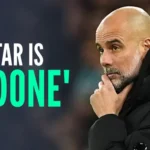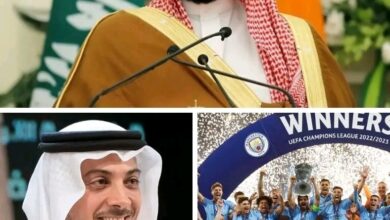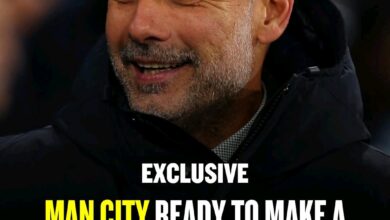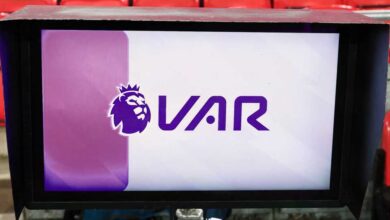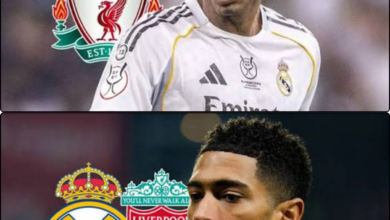Kyle Walker on Pep Guardiola discussions before leaving Manchester City – ‘It was not a very comfortable conversation’

In a move that sent shockwaves through European football, Kyle Walker has traded the sky blue of Manchester City for the iconic red and black stripes of AC Milan. The 34-year-old England international, who captained City to their fourth consecutive Premier League title last season, has embarked on an unexpected new chapter in his illustrious career, joining the Serie A giants on a loan deal with an option to purchase in the summer.
The Difficult Conversation
Walker’s departure from the Etihad Stadium didn’t come without its emotional challenges. Having established himself as a cornerstone of Pep Guardiola’s dynastic success, the conversation revealing his desire to leave was understandably fraught.
“When I spoke with Pep it was not a very comfortable conversation because of the respect that we both have for each other and what we’ve achieved at Manchester City,” Walker revealed in his first interview since completing the move. “Everything that he’s won at Manchester City, I’ve also won.”
This mutual respect had been forged through eight trophy-laden seasons together, during which Walker accumulated an enviable collection of silverware: six Premier League titles, two FA Cups, four League Cups, and the crowning glory of the UEFA Champions League in 2023. Few players have contributed as consistently to City’s era of dominance as the lightning-quick right-back.
“I would like to think that he knows what I bring to the dressing room and the atmosphere that I create,” Walker continued, highlighting the intangible leadership qualities that extended beyond his defensive responsibilities. “I’m here to play football. I’m here to work with my team-mates. But at Manchester City, it was my family, from the cooks to the cleaner to the kitman to the physios.”
This sense of belonging makes Walker’s decision all the more significant. Walking away from such an established comfort zone speaks volumes about his desire for new experiences at this stage of his career.
The Decision to Leave
At 34, many players might be contemplating winding down their careers, seeking one final payday, or transitioning toward coaching roles. Walker, however, remains driven by competitive ambition and the pursuit of new challenges.
“I could have stayed in Manchester. I still had a contract there. And I would have [respected] that contract if they wouldn’t have let me leave. That’s just me as a person,” he explained, emphasizing that his departure came with City’s blessing rather than through contractual disputes.
“But I think it comes down to challenges in life. I think sometimes you find yourself in a situation where you think, ‘I need to try something different’. And I spoke to many ex-players that had not moved abroad in a different league to the Premier League and they kind of said to me, ‘I wish I had experienced it now’.”
This sentiment reflects a growing trend among English players who, historically reluctant to venture beyond the Premier League’s comfortable confines, are increasingly seeking continental experiences. Walker joins a small but significant group of English talents in Serie A, with AC Milan already home to Fikayo Tomori, Ruben Loftus-Cheek, and Tammy Abraham.
The timing of Walker’s move also raises interesting questions about Manchester City’s own evolution. With their unprecedented quadruple of consecutive Premier League titles secured, Guardiola’s side faces the challenge of maintaining motivation and freshness. The departure of key leadership figures like Walker might signal the beginning of a squad refreshment strategy to prevent complacency from setting in.
The Fire Still Burns
Despite his advancing years, Walker is adamant that this move isn’t about securing a comfortable pre-retirement experience in Italy. The competitive flame that propelled him from Sheffield United academy graduate to one of the world’s elite right-backs still burns intensely.
“I think I’m still hungry. I still have the fire in my belly to go and achieve things and that’s the main thing,” he insisted with characteristic determination. “That’s why I really want to come here. I don’t want to just win things in one country. I want to come to another country and also win there as well.”
This hunger for fresh achievements speaks to Walker’s mentality. Having conquered every domestic and European honor with Manchester City, the prospect of adding Serie A success to his résumé represents a compelling new objective. It’s a refreshing perspective from a player who could easily have rested on his substantial laurels.
“If I wasn’t going to a big club I think I would have stayed in the Premier League, stayed at Manchester City and continued my career there,” Walker explained, underscoring that his decision was driven by ambition rather than a desire for change for its own sake. “But when a club like this comes knocking on the door for you – I think there’s only certain clubs in the world that you can kind of not say no to.”
AC Milan certainly qualifies as such an institution. With seven European Cup/Champions League triumphs and 19 Serie A titles, the Rossoneri’s storied history rivals that of any club in world football. Though they’ve experienced periods of relative decline in recent years, their 2022 Scudetto triumph signaled a resurgence that makes them a fitting destination for a player of Walker’s caliber and ambition.
The Beckham Connection
In a touching nod to another Englishman who made the journey from Manchester to Milan, Walker has chosen to wear the number 32 shirt during his time at San Siro—the same number David Beckham wore during his loan spell with the club in 2009 and 2010.
This homage to Beckham carries particular significance given the similarities in their career trajectories. Both established themselves as Premier League icons before seeking new challenges abroad, with Beckham’s stints at Real Madrid, LA Galaxy, AC Milan, and Paris Saint-Germain providing a template for English players expanding their horizons beyond domestic shores.
Beckham’s time in Milan, though brief, is remembered fondly by the club’s supporters. His professionalism, technical quality, and work ethic won respect in a football culture that has historically been skeptical of British imports. Walker will hope to follow in these footsteps while carving out his own legacy at the San Siro.
The Beckham connection extends further through a shared relationship with Zlatan Ibrahimović. The Swedish superstar played alongside Beckham at both LA Galaxy and Paris Saint-Germain and now serves as a senior advisor to AC Milan’s ownership group. Walker cited conversations with Ibrahimović as instrumental in his decision-making process.
“When I spoke to Zlatan, he made it clear that they were excited. They wanted to take me on board and that made me feel secure,” Walker revealed. “That made me feel [like] this is the right decision. That was the gut feeling I had and hopefully it’s a positive end to the season for me personally.”
The Impact on Manchester City
Walker’s departure creates both challenges and opportunities for his parent club. As captain and veteran presence, his leadership extended beyond tactical contributions. Few players embodied the relentless winning mentality of Guardiola’s City as completely as Walker, whose recovery pace and tactical understanding compensated for the team’s high defensive line and allowed their attacking talent to flourish.
Rumors circulating about Kevin De Bruyne potentially seeking an exit before the FIFA Club World Cup add further intrigue to City’s evolving situation. The Belgian maestro, like Walker, has been fundamental to the club’s golden era. Should both depart within the same year, it would represent a significant changing of the guard at the Etihad Stadium.
From a purely footballing perspective, City appear well-prepared for Walker’s absence. Portuguese international João Cancelo has returned from his loan spell at Barcelona, while Rico Lewis continues to develop impressively. The versatile Manuel Akanji has also demonstrated capability in the right-back position when required.
However, replacing Walker’s experience, particularly in high-pressure Champions League encounters, presents a more nuanced challenge. His departure might accelerate City’s rumored interest in Bayern Munich’s Alphonso Davies, whose contractual situation has alerted several European giants, including Liverpool.
The Serie A Challenge
Walker joins an AC Milan side with lofty ambitions but facing stern competition in Serie A. Currently embroiled in a fascinating title race with traditional rivals Inter Milan, Juventus, and Napoli, the Rossoneri will be hoping Walker’s championship pedigree provides the edge needed to secure domestic glory.
The English contingent already established at the club should facilitate Walker’s adaptation. Fikayo Tomori has developed into one of Serie A’s most respected central defenders since joining from Chelsea, while Ruben Loftus-Cheek has found the consistent playing time that eluded him in England. Tammy Abraham, though struggling with injuries since his arrival from Roma, offers another familiar face in the dressing room.
Walker’s elite experience will be particularly valuable in a league known for its tactical sophistication. Serie A’s traditional emphasis on defensive organization and positional discipline will test different aspects of his game compared to the Premier League’s physical intensity and transitional speed.
“I’ve always watched Italian football,” Walker noted during his unveiling. “The tactical understanding here is incredible. As a defender, there’s probably no better league to test yourself in. I’m excited to learn new approaches and adapt my game to these challenges.”
This willingness to evolve, even at 34, exemplifies the mindset that has kept Walker at the pinnacle of European football for over a decade. Rather than seeking comfort, he embraces the discomfort of new tactical demands and cultural adaptation.
Impact on England’s National Team
Walker’s move comes at an interesting juncture for his international career. Having played a crucial role in England’s journey to the Euro 2024 final last summer, questions naturally arise about how his Italian adventure might affect his standing in the national team setup.
England manager Lee Carsley, who replaced Gareth Southgate following the Euros disappointment, has emphasized the importance of players receiving regular playing time at competitive levels. Walker’s determination to pursue first-team football rather than accepting a reduced role at City aligns perfectly with this philosophy.
“I spoke with the manager before making this decision,” Walker revealed. “He was supportive of the move and assured me that performing consistently in Serie A would keep me in contention for England selection. At this stage of my career, I need to be playing regularly to maintain my international place, and Milan offers that opportunity.”
With the 2026 World Cup qualification campaign underway, Walker’s experience remains valuable to an England squad transitioning between generations. His versatility, capable of performing at right-back or on the right side of a back three, provides tactical flexibility that few other English defenders can match.
The reduced physical demands of Serie A, compared to the Premier League’s relentless intensity, might also extend Walker’s international longevity. The more measured pace and tactical emphasis could preserve his athleticism, potentially allowing him to remain in contention for selection through to the World Cup in the United States, Canada, and Mexico.
Cultural Adaptation
Beyond footballing considerations, Walker faces the personal challenge of adapting to life in a new country with different cultural and linguistic expectations. While the presence of English-speaking teammates will ease this transition, successful integration into Italian society represents an important aspect of his overall experience.
“I’ve already started Italian lessons,” Walker shared with characteristic enthusiasm. “I think it’s important to respect the culture and traditions of the club and country you’re representing. Communication on the pitch is essential, especially as a defender, so learning the language is a priority for me.”
This commitment to cultural immersion reflects Walker’s professional approach. Throughout his career, he has consistently demonstrated willingness to adapt to different tactical requirements and positional responsibilities. This flexibility has underpinned his longevity at the highest level.
Milan, as one of Italy’s most cosmopolitan cities, offers an appealing lifestyle destination. Its reputation for fashion, design, and cuisine creates an attractive environment for foreign players. The city’s football heritage, shared between AC Milan and their city rivals Inter, also ensures passionate support and high expectations.
“The history of this club is incredible,” Walker observed during his first visit to the San Siro. “You feel it immediately when you walk through the doors. The seven European Cups, the great players who have worn this shirt—it’s a privilege to be part of that tradition now.”
Tactical Fit in Milan’s System
Under manager Paulo Fonseca, Milan have employed a fluid 4-2-3-1 formation that should accommodate Walker’s attributes effectively. The Portuguese coach favors an approach that combines positional play with vertical transitions, creating space for his full-backs to advance when opportunities arise.
Walker’s exceptional recovery speed provides tactical security for this progressive approach. His ability to defend in isolation against counter-attacks allows Milan’s left-back Theo Hernandez greater freedom to express his attacking instincts on the opposite flank.
“Kyle brings qualities that complement our existing squad perfectly,” Fonseca explained following the announcement. “His experience at the highest level, defensive reliability, and understanding of positional play will strengthen our tactical structure significantly.”
The presence of Tomori, with whom Walker has shared an England dressing room, should facilitate quick defensive cohesion. Their familiarity with each other’s communication styles and defensive principles will prove valuable as Walker acclimatizes to Serie A’s unique challenges.
“Fikayo has been incredibly helpful already,” Walker acknowledged. “He’s explained the differences in refereeing, the tactical approaches of different Italian teams, and little cultural things that help you settle. Having that English connection in defense gives us a head start in building understanding.”
Legacy Considerations
At this stage of his career, Walker’s decisions inevitably carry legacy implications. Having cemented his status as a Manchester City legend and Premier League great, his Italian chapter offers an opportunity to enhance an already remarkable career narrative.
Few English defenders have successfully exported their talents to Serie A. The league’s traditional emphasis on tactical discipline and technical defending has historically proven challenging for British players schooled in the more physically direct Premier League environment.
Should Walker adapt successfully and contribute to Milan’s return to domestic and European prominence, he would join a select group of English players who have thrived in multiple major European leagues. This international dimension would distinguish his legacy from contemporaries who spent their entire careers within the Premier League ecosystem.
“I’m conscious that not many English defenders have made this journey and succeeded,” Walker reflected. “That’s part of the motivation. I want to show that English players can adapt and excel in different tactical environments. If I can help change perceptions about English defenders abroad, that would be a source of pride.”
This broader perspective reflects Walker’s understanding of his place within football history. Beyond personal accolades and team trophies, his willingness to embrace new challenges in his thirties demonstrates admirable professional courage and curiosity.
Looking Ahead
As Walker embarks on this unexpected chapter, both his parent club and temporary home find themselves at fascinating junctures. Manchester City must navigate the gradual transition from the core group that delivered unprecedented domestic dominance, while AC Milan seek to recapture former glories through a blend of experienced champions and emerging talents.
Walker’s loan agreement includes an option for Milan to make the transfer permanent in the summer, providing both clubs and the player with flexibility depending on how the arrangement unfolds. This structure acknowledges the experimental nature of the move while offering a pathway to permanence if successful.
“I’m approaching this as a new beginning, not just a short-term experience,” Walker insisted. “If things go well and the club wants me to stay beyond this season, that’s a conversation we’ll have. Right now, I’m focused on adapting quickly and contributing to our objectives for this campaign.”
Those objectives include challenging for the Serie A title, progressing in the Champions League, and continuing Milan’s resurgence as a European footballing powerhouse. Walker’s championship experience and big-match temperament will prove invaluable in pursuing these ambitions.
For neutrals, Walker’s Italian adventure offers a compelling narrative to follow. His performances will be scrutinized not just for their impact on Milan’s fortunes but as a case study in the portability of Premier League excellence to different tactical environments.
“I’ve achieved everything I could in England,” Walker concluded. “Now it’s time to test myself in a new environment, with different challenges and expectations. That’s what keeps you motivated as a professional—the desire to prove yourself in new contexts, to keep learning and evolving as a player and person.”
This philosophical outlook encapsulates the refreshing approach Walker has brought to this unexpected career move. Rather than seeking comfort in familiarity during his final years at the top level, he has embraced the uncertainty and challenge of reinvention. In doing so, he offers an inspiring template for veteran players contemplating their late-career choices and legacy considerations.
As he dons the iconic red and black stripes and steps onto the San Siro turf, Walker carries not just his own ambitions but the curiosity of English football observers eager to see how one of their modern defensive greats adapts to the tactical sophistication of Italian football. The journey promises fascination regardless of its ultimate outcome.


